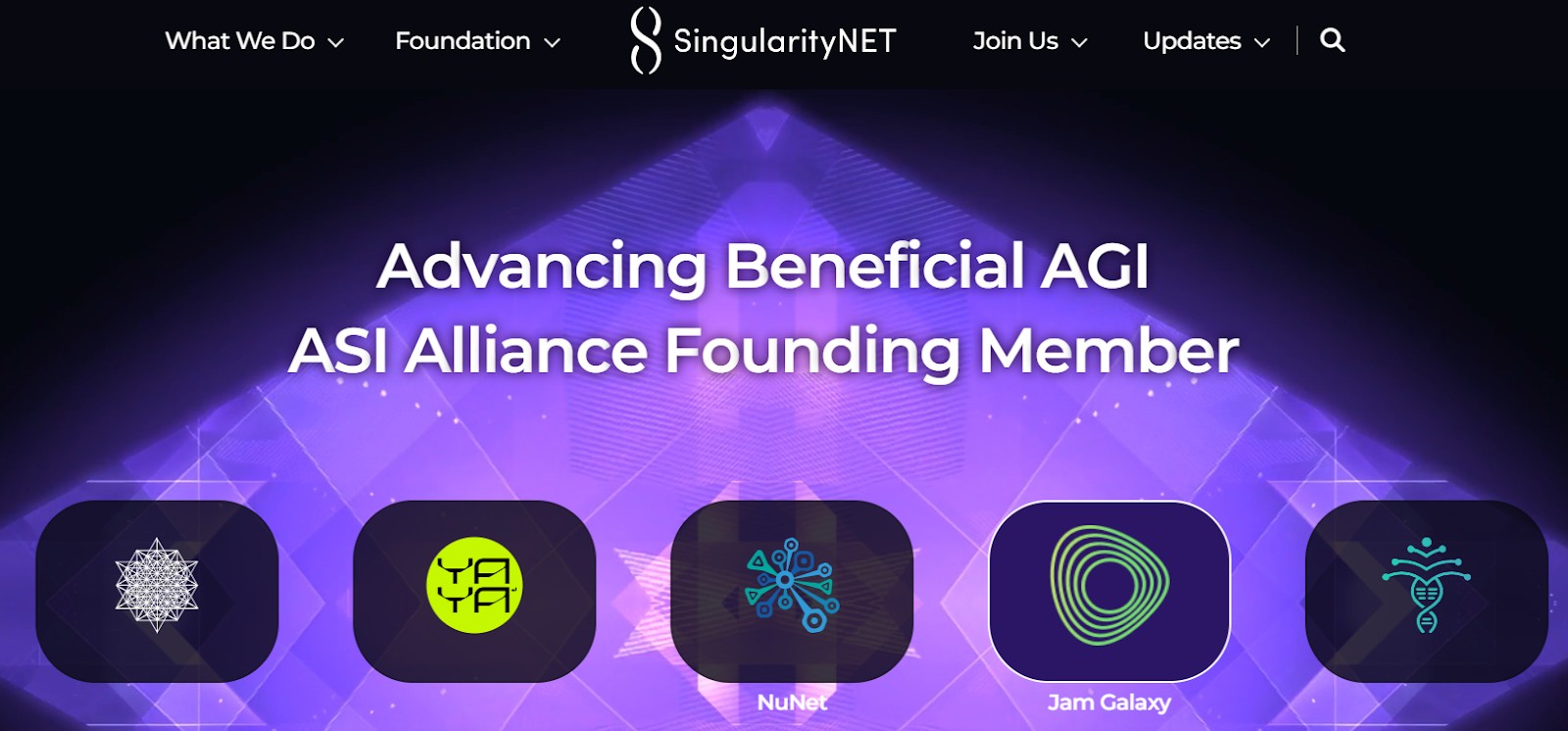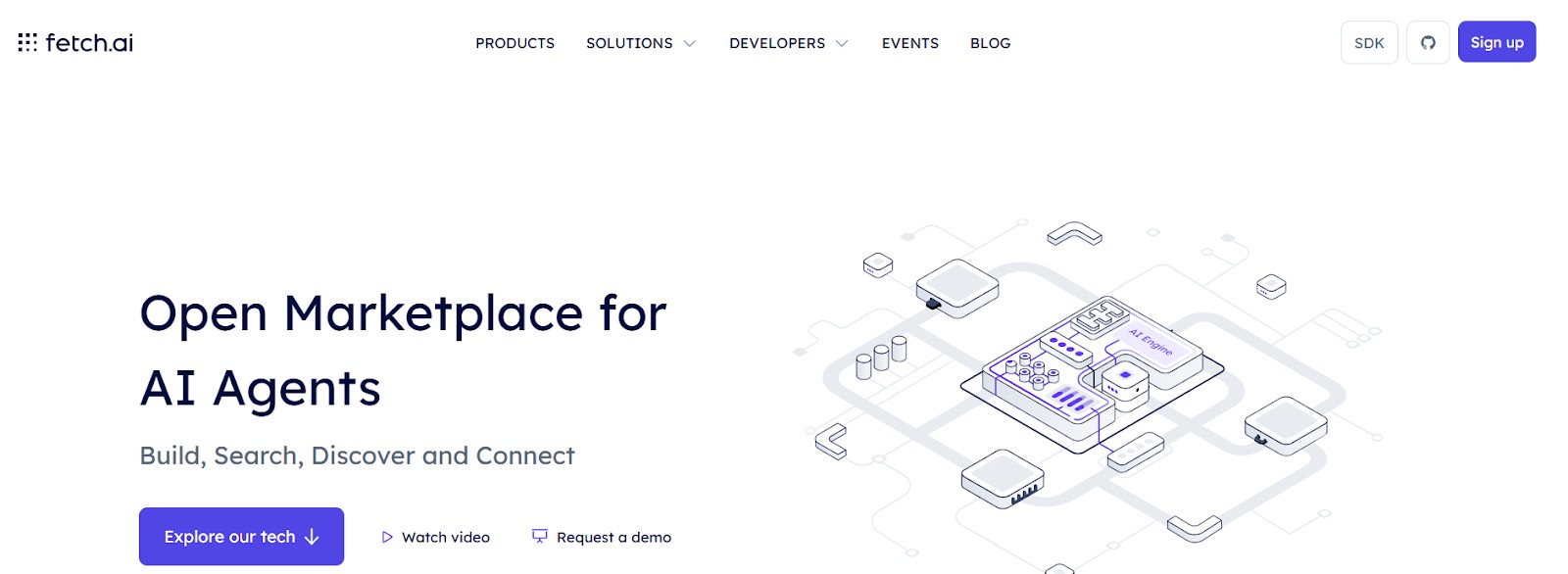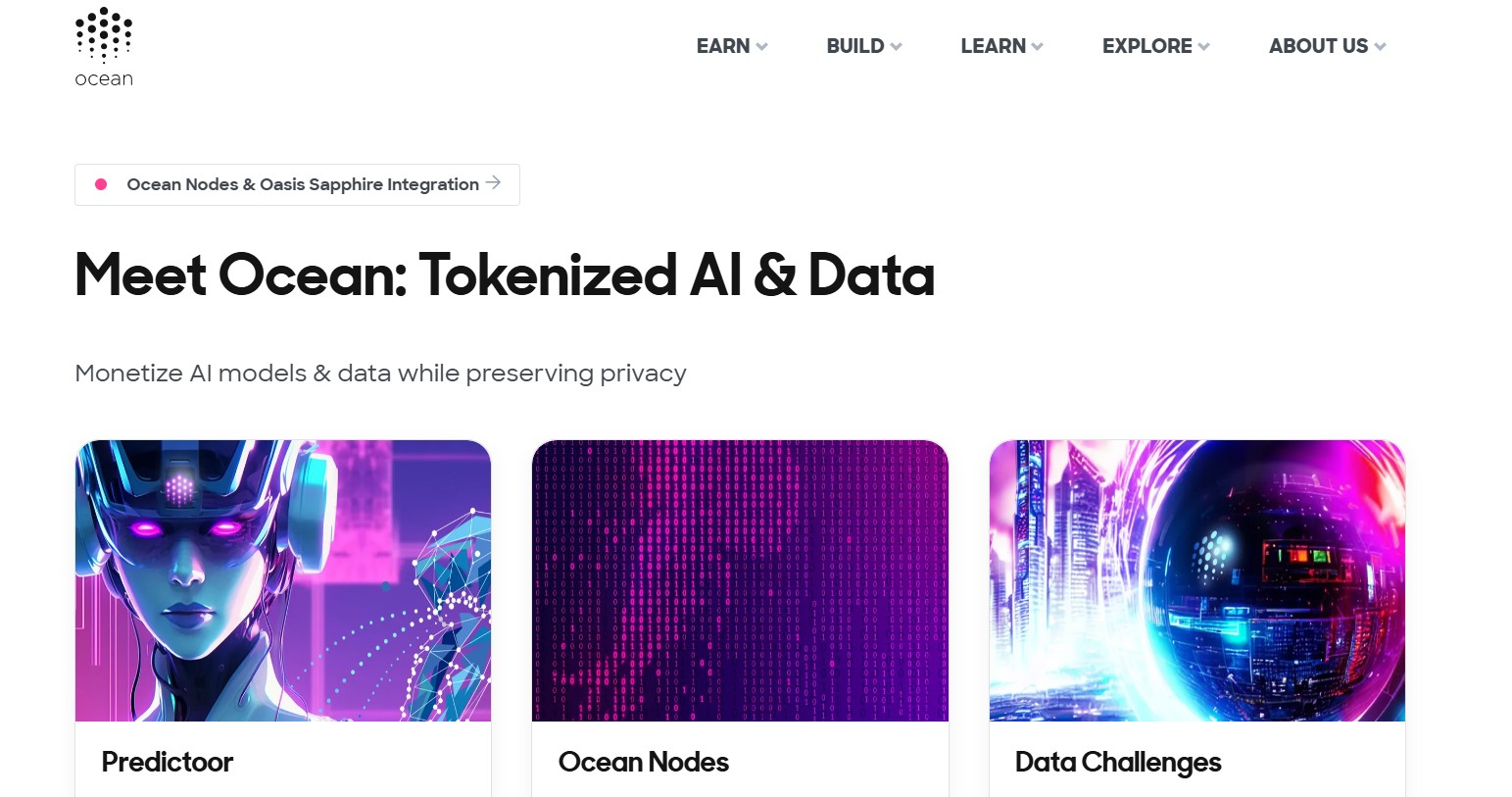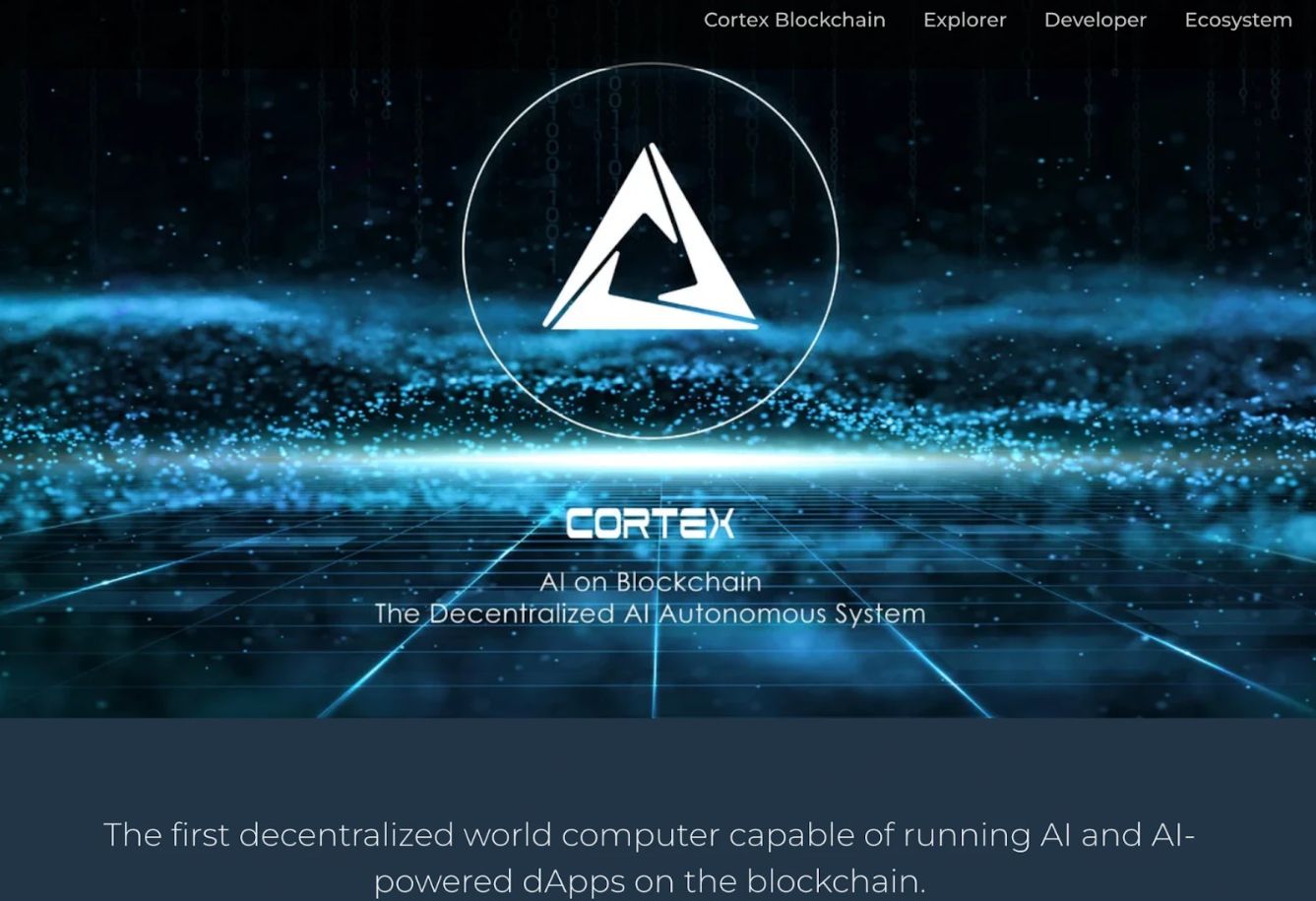Top AI Blockchain Projects In 2025



Editorial Note: While we adhere to strict Editorial Integrity, this post may contain references to products from our partners. Here's an explanation for How We Make Money. None of the data and information on this webpage constitutes investment advice according to our Disclaimer.
Best AI blockchain projects to watch:
SingularityNET (AGIX) – a decentralized AI marketplace where developers can create, share, and monetize AI services.
Fetch.ai (FET) – an AI-powered blockchain enabling autonomous machine-to-machine transactions and smart automation.
Ocean Protocol (OCEAN) – a decentralized data exchange platform allowing AI models to access and analyze data securely.
Numeraire (NMR) – an AI-driven hedge fund leveraging blockchain to enhance stock market predictions.
Cortex (CTXC) – a blockchain supporting AI-powered smart contracts that enable machine.
AI and blockchain are two powerful technologies that have changed the way businesses work. AI helps with tasks like automation and smart predictions, while blockchain keeps data secure, transparent, and decentralized. When combined, they open up new possibilities for solving complex problems in industries like healthcare and finance. This article takes a closer look at AI blockchain projects, exploring their benefits, risks, and real-world uses.
Risk warning: Cryptocurrency markets are highly volatile, with sharp price swings and regulatory uncertainties. Research indicates that 75-90% of traders face losses. Only invest discretionary funds and consult an experienced financial advisor.
Top 5 AI blockchain projects to watch in 2025
AI and blockchain are two revolutionary technologies that, when combined, offer decentralized intelligence, automation, enhanced security, and data privacy. Below are five of the most promising AI blockchain projects that are leading the way in 2025.
SingularityNET (AGIX)
SingularityNET is a decentralized AI marketplace that allows developers to create, share, and monetize AI services through blockchain technology. Founded by Dr. Ben Goertzel, the project aims to democratize AI access by enabling open collaboration among AI models and systems.

Features:
Decentralized AI Marketplace. Users can buy and sell AI services without a centralized authority.
Interoperability. AI agents can communicate and share data across various applications.
AGIX Token. The native token powers transactions, AI service payments, and governance.
AI-as-a-Service (AIaaS). Developers can deploy AI models on-chain and earn rewards.
Use cases:
AI-powered chatbots, data analytics, fraud detection, and machine learning model sharing.
Fetch.ai (FET)
Fetch.ai is an AI-powered blockchain network focused on autonomous machine-to-machine communication. It enables the creation of self-learning smart agents that automate tasks such as financial trading, logistics, and supply chain management.

Features:
Autonomous Economic Agents (AEAs). AI-driven bots that perform transactions without human intervention.
DeFi Integration. AI-powered trading bots optimize liquidity pools and market-making.
Smart Cities & IoT. AI manages traffic data, energy distribution, and predictive maintenance.
Scalable Blockchain. High-speed, low-cost transactions for AI-powered dApps.
Use cases:
AI-driven decentralized finance (DeFi), automated supply chains, and smart city optimization.
Ocean Protocol (OCEAN)
Ocean Protocol is a decentralized data exchange that allows AI developers to access, share, and monetize data while maintaining privacy and security. It provides a trusted platform for AI model training using blockchain technology.

Features:
Decentralized Data Marketplace. Users can buy and sell datasets without intermediaries.
AI-Optimized Data Sharing. Securely train AI models without exposing raw data.
OCEAN Token. Used for governance, staking, and buying/selling datasets.
Compute-to-Data. AI models can analyze data without transferring ownership.
Use cases
AI-driven healthcare analytics, financial forecasting, and autonomous vehicle data sharing.
Numeraire (NMR)
Numeraire is an AI-powered hedge fund that uses blockchain to create a decentralized stock market prediction model. It allows data scientists to submit AI-driven trading strategies, which are tested in real-world market conditions.
Features:
Decentralized Hedge Fund. AI-driven trading models enhance investment strategies.
NMR Token Staking. Traders stake NMR to back their models, earning rewards for accuracy.
Crowdsourced AI Models. Multiple AI-driven strategies contribute to market efficiency.
Privacy-Preserving Data. Blockchain ensures AI models operate with secure, encrypted data.
Use cases:
Stock market predictions, risk analysis, and AI-based financial trading strategies.
Cortex (CTXC)
Cortex is the first blockchain that enables AI-powered smart contracts. Developers can integrate machine learning models into decentralized applications (dApps), allowing AI-driven automation on-chain.

Features:
AI Smart Contracts. AI models process data and execute blockchain transactions.
Machine Learning on Blockchain. Developers upload AI models that interact with dApps.
Decentralized AI Computation. Users can train AI models in a decentralized environment.
CTXC Token. Used for AI computation and network governance.
Use cases:
AI-enhanced DeFi platforms, fraud detection in finance, and automated decision-making in smart contracts.
What are AI blockchain projects?
AI blockchain projects combine artificial intelligence (AI) with blockchain to create systems that are smarter, more secure, and more transparent. These projects use AI to help blockchain perform better — making it faster, scalable, and more efficient — while also using AI to predict trends and streamline processes. For instance, AI can analyze data to forecast market behavior, helping businesses make smarter decisions in real-time.
In these projects, AI can power smart contracts that run automatically without needing human input. This means decisions are made based on data, not just people’s judgment. In practical terms, this could help industries like logistics, where AI-driven blockchain systems could anticipate issues in supply chains and fix them before they become problems. By combining blockchain’s trustless nature with AI’s ability to learn and adapt, the future of these projects looks incredibly exciting.
How they work
AI blockchain projects combine the decentralized nature of blockchain with AI's intelligent decision-making. Here are some insights:
AI takes over decision-making. Instead of relying on human opinions, AI models are used to propose upgrades, making decisions based purely on data analysis.
Blockchain keeps AI data safe. AI model data and training info are stored securely on the blockchain, preventing tampering and ensuring its integrity.
AI enhances smart contracts. AI can analyze live data and predict trends, automatically triggering actions in smart contracts to keep things running smoothly.
Autonomous AI agents at work. Some projects use AI agents that handle tasks like trading or creating content, running without needing human input.
Privacy protection through AI. AI helps protect sensitive information on the blockchain, allowing for secure computations without compromising privacy.
AI-driven consensus that’s more efficient. AI improves how consensus mechanisms work by adjusting their parameters automatically based on the network's needs, making processes faster and greener.
Technological components
Understanding the technological components of AI in blockchain can unlock the potential for groundbreaking applications. Here are some unique insights to help you get started:
Bridging different blockchains. AI in blockchain often uses tools to connect multiple chains, making it easier to share data and work together.
Storing data across the network. Blockchain-based AI projects rely on decentralized storage like IPFS, which spreads data across many places for better security and reliability.
AI running directly on the blockchain. Some projects are putting AI right on the blockchain, allowing users to access smart features without needing a central server.
Smart contracts with learning abilities. In some blockchain projects, smart contracts use AI to learn and adapt over time, allowing them to make smarter decisions without human input.
AI optimizing decision-making. Certain blockchain systems are using AI to make consensus decisions faster, more efficiently, and with less energy use.
Protecting privacy with AI. AI is helping blockchain apps protect privacy by processing encrypted data, ensuring users’ information stays secure while still enabling transactions.
Step-by-step guide to understanding AI blockchain projects
AI blockchain projects are a combination of two transformative technologies. Here’s a deeper dive into what makes them tick:
Look at how data is controlled. In AI blockchain, it’s the users who hold the reins on their own data, offering more privacy and security in AI interactions.
Seek out decentralized AI. Some AI blockchain projects let communities control how AI algorithms evolve, removing central authority.
Understand the role of tokens. Tokens can motivate users to share data, improve AI models, and help govern the project.
Check out edge AI. Some projects use edge computing, meaning the data gets processed right where it’s created, speeding things up and saving resources.
Track how AI is trained. Blockchain can record every step of training AI models, so you can be sure everything’s above board and transparent.
Think about how it grows. Good AI blockchain projects focus on scalability, ensuring they can handle more complex AI models as they grow.
Many AI blockchain projects also have their listed coins, which you can purchase through crypto exchanges. Here are some of the best exchanges you can use to trade and invest in crypto:
| Min. Deposit, $ | Coins Supported | Staking | Spot Taker fee, % | Spot Maker Fee, % | P2P Taker Fee, % | P2P Maker Fee, % | Regulation level | Open an account | |
|---|---|---|---|---|---|---|---|---|---|
| 10 | 329 | Yes | 0,1 | 0,08 | 0 | 0 | No | Open an account Your capital is at risk. |
|
| 10 | 278 | Yes | 0,4 | 0,25 | Not supported | Not supported | Yes | Open an account Your capital is at risk. |
|
| 1 | 250 | Yes | 0,5 | 0,25 | 0,16 - 0,20 | 0,10 - 0,16 | Yes | Open an account Your capital is at risk. |
|
| 1 | 72 | Yes | 0,2 | 0,1 | 0,2 | 0,1 | Yes | Open an account Your capital is at risk. |
|
| No | 1817 | No | 0 | 0 | No | No | No | Open an account Your capital is at risk. |
Risks and warnings
Blockchain and AI hold great promise, but combining them introduces specific challenges that need careful attention. Here’s what you should be aware of:
Blockchain's limitations. While blockchain can be powerful, it struggles to handle the rapid processing needs of AI.
Privacy risks. AI data stored on public blockchains can be exposed, even if encrypted, creating privacy issues.
Transaction costs. Blockchain transactions come with fees, which can pile up when AI models need frequent updates.
Difficulty in combining systems. The challenge of making decentralized blockchain systems work well with centralized AI systems can be tricky.
No clear guidelines. There’s no clear path for integrating AI and blockchain, leading to confusion and slow progress.
Potential security holes. Without proper implementation, blockchain systems could bring new ways for attackers to compromise AI systems.
How much can I earn in AI blockchain projects?
The earning potential in AI blockchain projects depends on the role you play within the ecosystem. From staking to token investments, this section outlines the key avenues to generate income as a full-time participant.
Staking. By supporting blockchain networks through staking, participants can earn consistent rewards. Returns typically depend on the number of tokens staked and the network’s reward policies, ranging from 5% to 20% annually on average.
Token investments. Early investments in AI blockchain projects can yield high returns if the project succeeds. Investors who back innovative projects during their initial stages often see their holdings multiply as adoption grows.
Developing solutions. Building and deploying AI applications within blockchain ecosystems can be highly lucrative. Developers can monetize their solutions through licensing, marketplace sales, or offering AI services directly to clients.
Factors influencing earnings:
Technical expertise. Proficiency in blockchain and AI technologies directly impacts earning potential. High-level skills enable better project participation and higher-value contributions.
Market trends. Market demand for AI blockchain services or tokens can fluctuate, influencing income stability and growth opportunities.
Token volatility. The inherent volatility of blockchain ecosystems means that token values can rise or fall dramatically, impacting earnings from staking or investments.
AI blockchain projects optimizing efficiency and enhancing security through self-learning
AI blockchain projects are more than just a combination of two emerging technologies — they are transforming industries in ways you might not expect. These projects enable AI-powered systems that are decentralized, offering higher transparency and trust. What’s really interesting is how AI can even optimize blockchain itself. From predicting market trends to smart contracts that update automatically based on real-time data, the integration of AI and blockchain is paving the way for more efficient systems.
A huge advantage of AI blockchain projects is how AI can make blockchain networks smarter over time. It can detect slowdowns, suggest improvements, and automate processes, reducing the need for manual fixes. The real kicker, though, is that AI systems are continuously learning from the data they handle. This makes these blockchains more secure and resistant to failures. The combination of AI’s adaptability and blockchain’s security is what makes these projects so powerful, promising a future far beyond what we see in either technology today.
Conclusion
AI blockchain projects represent the future of secure, intelligent, and decentralized systems. By merging AI’s analytical prowess with blockchain’s transparency, these projects unlock unprecedented possibilities across industries. However, potential adopters must balance the risks and rewards by staying informed, learning continuously, and engaging strategically.
AI blockchain projects are not just technologies of tomorrow; they are transformative tools shaping today. Take the first step into this innovative world to discover its full potential.
FAQs
Can AI blockchain projects operate without cryptocurrencies?
Yes, while many AI blockchain projects use cryptocurrencies for incentives or transactions, the underlying technology can function without them. For instance, private blockchains can integrate AI to improve internal processes without requiring tokens.
How do AI blockchain projects ensure data privacy?
AI blockchain projects use encryption and decentralized storage to secure data. Techniques like homomorphic encryption and zero-knowledge proofs allow AI to analyze data without accessing sensitive information.
Are there free resources to learn about AI blockchain projects?
Absolutely. Platforms like GitHub, OpenAI, and Blockchain Council offer free tutorials, repositories, and forums to get started with AI blockchain technology.
What industries benefit the most from AI blockchain integration?
Healthcare, finance, supply chain, and energy sectors are the primary beneficiaries. These industries leverage AI for analytics and blockchain for secure, transparent operations.
Related Articles
Team that worked on the article
Oleg Tkachenko is an economic analyst and risk manager having more than 14 years of experience in working with systemically important banks, investment companies, and analytical platforms. He has been a Traders Union analyst since 2018. His primary specialties are analysis and prediction of price tendencies in the Forex, stock, commodity, and cryptocurrency markets, as well as the development of trading strategies and individual risk management systems. He also analyzes nonstandard investing markets and studies trading psychology.
Also, Oleg became a member of the National Union of Journalists of Ukraine (membership card No. 4575, international certificate UKR4494).
Chinmay Soni is a financial analyst with more than 5 years of experience in working with stocks, Forex, derivatives, and other assets. As a founder of a boutique research firm and an active researcher, he covers various industries and fields, providing insights backed by statistical data. He is also an educator in the field of finance and technology.
As an author for Traders Union, he contributes his deep analytical insights on various topics, taking into account various aspects.
Mirjan Hipolito is a journalist and news editor at Traders Union. She is an expert crypto writer with five years of experience in the financial markets. Her specialties are daily market news, price predictions, and Initial Coin Offerings (ICO).
Yield refers to the earnings or income derived from an investment. It mirrors the returns generated by owning assets such as stocks, bonds, or other financial instruments.
Volatility refers to the degree of variation or fluctuation in the price or value of a financial asset, such as stocks, bonds, or cryptocurrencies, over a period of time. Higher volatility indicates that an asset's price is experiencing more significant and rapid price swings, while lower volatility suggests relatively stable and gradual price movements.
An investor is an individual, who invests money in an asset with the expectation that its value would appreciate in the future. The asset can be anything, including a bond, debenture, mutual fund, equity, gold, silver, exchange-traded funds (ETFs), and real-estate property.
Cryptocurrency is a type of digital or virtual currency that relies on cryptography for security. Unlike traditional currencies issued by governments (fiat currencies), cryptocurrencies operate on decentralized networks, typically based on blockchain technology.
Forex leverage is a tool enabling traders to control larger positions with a relatively small amount of capital, amplifying potential profits and losses based on the chosen leverage ratio.






























































































































